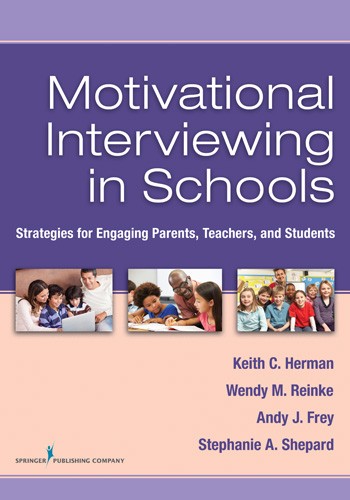
There have been many studies that point toward parental involvement as the main predictor of student achievement. So, how do we get more parents, teachers and students involved? The authors of this book focus on that question and provide a consultation approach as a possible answer.
The focus of the book is to introduce the reader to the basic concepts, skills and techniques of motivational interviewing (MI) and how this approach can be used as a consultation model for working with parents, teachers and students. The authors provide a unique lens for viewing consultation that is not confined to mental health and substance abuse facilities, but rather concentrated within the school setting. According to a 2013 article by Frey, Sims, and Alvarez, this focus on school-based consultation using MI will only expand in the future.
The authors organize the book in three sections. Part I is an overview of MI, Part II covers the applications of skills and Part III targets the implementation of the approach within other practices. Clearly, the authors are intentional about how the chapters fall within the three parts of the book and build upon one another. The inclusion of the Family Check-Up (FCU) within Chapter 7 emphasizes the importance of a systemic approach to consultation (e.g., family functioning), and integrating this approach with existing evidence-based programs and practices (Chapter 9) is a definite strength.
I was most impressed with the inclusion of examples, stories and practice boxes scattered throughout the chapters. The inclusion of Everyday Conversations about Change and Success Stories helps the reader visualize ways that educational personnel are successful in creating positive change. The authors are patient with the reader and incorporate various practice boxes allowing readers to review new concepts and test their knowledge.
Resources are plentiful throughout this book, and each chapter concludes with handouts that reflect what the chapter reviews (e.g., structured charts, surveys, activities). It is obvious that the authors appreciate the reader and want them to have the necessary tools available to integrate this approach.
The authors seem to generalize the roles of educational personnel within the school setting. The book takes a broad view of consultation and how it might look the same for everyone working with teachers, parents and students. I believe it would be impactful to include examples of specific educational personnel and share how MI could be integrated in different ways within various assigned job roles. One example could include a school psychologist using MI consultation skills with a parent in a conversation regarding the testing and eligibility for exceptional education services. Another might focus on a school counselor using MI techniques with a student discussing college and career planning, or with a teacher sharing ideas of what to include in a response to intervention (RtI) plan. Another example could demonstrate the role of a behavioral specialist using collaborating skills with a student while updating his or her personal behavioral plan. Understanding the distinct roles that individuals have within schools and the relevance of consultation within those roles could be quite valuable for readers.
This book could be used in beginning teacher preparation programs to introduce the key concepts of consultation and the collaborative process within schools. Administrators also could use it as a “book study” to promote a conversation on consultation and collaboration with all school stakeholders, including parents and community members.
Future questions could address how the MI approach to consultation can impact learning and affect outcome measures (e.g., GPA, truancy, graduation rates, enrollment in advanced courses, retention rates). How can the impact of using this technique in the schools become clearer? That is yet another question that must be explored.
Reviewed by: Stacy M. Van Horn, University of Central Florida, Orlando, FL.
Herman, K. C., Reinke, W. M., Frey, A. J., & Shepard, S. A. (2014). Motivational interviewing in schools: Strategies for engaging parents, teachers, and students. New York, NY: Springer.
References
Frey, A. J., Sims, K., & Alvarez, M. E. (2013). The promise of motivational interviewing for securing a niche in the Rtl movement. Children and Schools, 35, 67-70.
Ingraham, C.L. (2000). Consultation through a multicultural lens: Multicultural and cross-cultural consultation in schools. School Psychology Review, 29, 320-343.
The Professional Counselor
